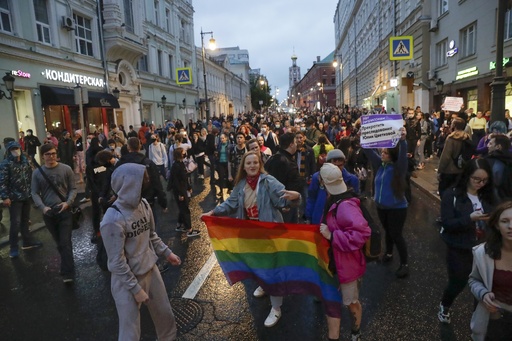TALLINN, Estonia — In recent months, human rights organizations, activists, and independent media from Russia and Belarus have been facing heightened government scrutiny and repressive legislation, forcing many to operate from exile. Despite enduring these challenges, they have managed to continue their work. However, a new hurdle has emerged: the recent decision by U.S. President Donald Trump to suspend aid for a period of 90 days.
This financial support, which is channeled through the U.S. Agency for International Development and other U.S.-funded entities, has played a critical role in assisting several organizations in their operations. An activist from Center-T, a notable Russian transgender organization, reflected on the freeze, stating that it significantly hampers their capacity to make meaningful impacts. “Objectively, it’s a very bad thing… Organizations could have done much more significant things if it weren’t for this situation,” said the activist, remaining anonymous for safety reasons.
The repercussions of the aid freeze are being felt across different groups, with varied responses. While many organizations primarily rely on alternative funding streams such as private contributions, there is uncertainty regarding which partnerships are tied to U.S. aid and whether those connections might lead to further withdrawals of support.
Despite the challenging landscape, some groups have expressed their intent to continue operations, albeit with budget reductions and adjusted plans. Dmitry Anisimov from OVD-Info, a group focused on documenting political arrests, noted that their reliance on private donations means the freeze has limited impact on their operations. However, he acknowledged that losing supportive collaborators would complicate their work and restrict assistance for those in need.
An editor from an independent Russian news outlet, now functioning from exile, echoed similar sentiments regarding the impact of lost grants. Although their organization experienced a budget reduction of under 10% due to the freeze, the editor remained hopeful, explaining, “Yes, it’s hard, unpleasant, difficult, but we’re not on the brink of imminently shutting down.”
Center-T’s staff shared that they were among the more fortunate groups, having relied minimally on U.S. funding. Meanwhile, Kovcheg, an organization that supports Russians fleeing the country, reported a significant loss of 30% of its budget. Nonetheless, its founder Anastasia Burakova emphasized that they remain stable due to crowdfunding initiatives and other revenue sources.
Burakova highlighted the increasing difficulties posed by stringent laws that deter Russian donors from supporting rights groups, many of which are now labeled “foreign agents” by authorities. This designation carries a negative stigma, discouraging potential contributions and rendering organizations ineligible for advertising. Such regulations have compelled numerous entities to relocate operations overseas following Russia’s incursion into Ukraine.
In response to the aid freeze, lottery tycoon-turned-opposition figure Mikhail Khodorkovsky and philanthropist Boris Zimin announced a $600,000 fund to support affected projects in Russia and Ukraine. While it remains unclear how many organizations were previously receiving U.S. aid and how Khodorkovsky’s funding may mitigate losses, Zimin expressed the need to assist vital media initiatives. “Of course, it wouldn’t be enough… I consider it my duty to support them at least for some time,” he stated.
Belarusian pro-democracy organizations are also grappling with the loss of U.S. aid, estimated at around $30 million—representing more than half of their Western funding. This support is crucial for numerous NGOs and independent media groups that are now teetering on the edge of closure. An individual close to Belarusian opposition leaders revealed that they have prepared a report detailing the freeze’s effects, reaffirming that the absence of independent media will allow authoritarian narratives to dominate the public discourse.
One activist noted that out of 30 major Belarusian media groups operating from abroad, six have reported a total loss of funding, placing them on the brink of shutdown. An additional $1.7 million in frozen U.S. aid affects many independent outlets that fled Belarus following a crackdown on dissent in 2020. With dwindling finances, small newsrooms are forced to downsize their teams, jeopardizing their future viability.
Several projects, particularly a popular YouTube show, are seeking donations while grappling with new uncertainties. The show’s staff acknowledged that while they’ve faced challenges, they are committed to continuing their work to ensure Belarusians remain informed.
Rights groups face similar risks, with estimates suggesting that between 60-80 groups may confront layoffs or closure, significantly hindering their outreach and support programs. Advocacy for political prisoners, educational initiatives, and platforms for activists may all suffer substantial cuts as a consequence.
With over 1,200 political prisoners recorded in Belarus, the stakes are high for organizations like Viasna, which has seen its capacity to operate potentially compromised due to the funding freeze. Pavel Sapelka, a Viasna activist, noted, “It will significantly impair our work,” but added that it wouldn’t entirely halt human rights advocacy efforts.
Amidst these setbacks, Franak Via?orka, an adviser to key opposition leader Sviatlana Tsikhanouskaya, emphasized the urgency of finding ways to sustain the independent media landscape and civil society in Belarus as they face yet another significant challenge. A request for comment from the State Department’s European and Eurasian Bureau has yet to receive a response.
